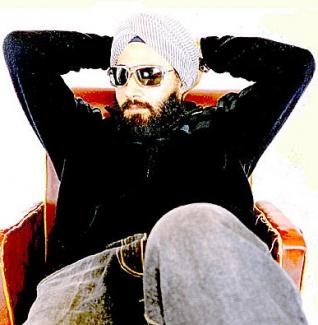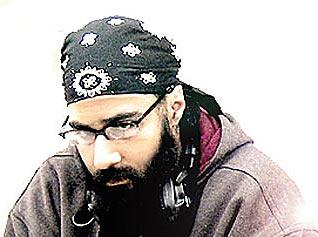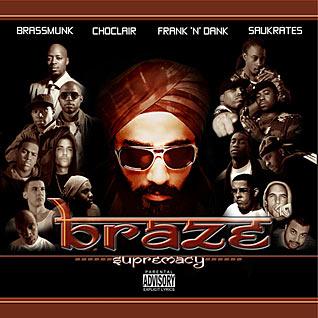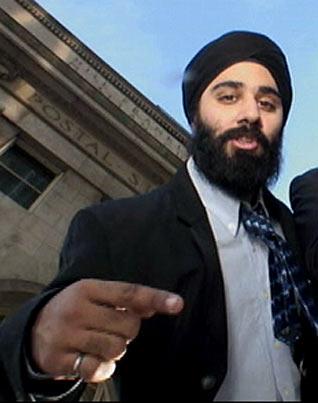Music
"One of the Year's Best!"
An Interview by KON LAM
Hailing from the west-end of the Greater Toronto Area in Canada, producer Braze is igniting the hip-hop community with a music that resonates soundly in the ears of his listeners. Braze's unique looks are further surpassed by his even more unique sound. A practicing Sikh of Indian descent, Braze is a true backpack hip-hopper ‘till the end. Whether he's bringing the flavour with some Old-School boom bap or carving traditional music and instruments from his culture into the sensibilities of hip-hop, Braze brings the heat.
After years working mysteriously in the sound labs, ghost-producing several acclaimed tracks, Braze emerges with an explosive album propelling him into the limelight. His debut album, Supremacy, is already being called one of the year's best produced albums. In it, Braze teams up with an array of accomplished artists including Choclair, Brassmunk, Frank ‘N' Dank and Saukrates. "Over Here, Over There", featuring the well-known Detroit emcees Frank ‘N' Dank, is the first single off Supremacy. Its video is receiving rotation on national airwaves and the track is being blasted on syndicated radio stations across the country. The album is resoundingly inventive and is a testament to the crossover success hip-hop is capable of. With an eclectic sound and a magnetic personality to boot, Braze is a producer Canada should be proud to call its own!
HHC: Tell me the story of how you got started with producing.
I always just loved music. I was a backpack kid so I was always listening to music, collecting vinyl, spinning at parties - not only hip-hop, but all genres. I was in University (U of Toronto) in my undergrad when I started really getting into production; it was around 2000 - 2001. I fooled around with it (producing) through my buddy that was doing music at the time. I really enjoyed it and shortly after I went out and bought an Akai MPC 2000 XL. I kept working on beats and slowly my stuff started getting out there. I was doing some ghost-producing for a few U.S. rap artists. I was making a bit of money with this and I was building up my skills, honing my craft at the same time; not a bad gig.
HHC: One of the things with mainstream hip-hop, or just mainstream music in particular, is the importance of image. You admit yourself that you have a completely different look. When you meet with clientele and artists for the first time do you fear they might judge you by that?
There have been instances where I felt like that was an issue, but overall I don't feel it's an issue. It's probably more of an issue in parts of the States but not as much in Canada. People, overall are quite open and educated here. The bottom line is that dudes just want to hear your tracks and my music speaks for itself. I'm lucky because I have a long list of people I've worked with that can attest to the skills I bring... so that makes it easier in this industry. Image will always be a big factor in the game. People want to put an image on the music they're listening too.
HHC: The role of a producer in hip-hop differs drastically from producers of all other genres of music. Hip-hop producers serve as the arranger/composer of the scores and often play the role of engineer as well. What is your opinion on the title of "producers" and considering your training in other forms of music, what do you think of your role and do you think that it's a misnomer in some ways?
It's funny you mention that. I read an article recently where Timbaland's talking about the same thing. He was saying how he doesn't see himself as a "producer" per se, but that he's a composer. I guess I think the same way. In hip-hop, you have to put down everything in terms of the track - the beat, the arrangement, everything. The role's a lot bigger than a producer in other forms of music I think. A hip-hop beat - a good one, can make or break a track. I think heads who really understand this music recognize that a producer in hip-hop means you are a composer and they deserve more limelight- ha! [Laughing]
HHC: You worked with a lot of artists for Supremacy . Did you have any input in what the artists rapped about? What did you want this album to say?
I picked the theme of my album - what it would sound like - based on my emcee selection. The guys were all really experienced, so, for the most part; I let them do their thing. They're all very talented so I knew that they'd come up with something fresh. Here and there, in the studio, we might talk about, "Let's do this to the hook," and all that just because we were working together for all the tracks. Overall, I just wanted the album to be a bit of everything, not necessarily containing one particular concept... just a solid producer album.
HHC: What gave you the confidence to put out your own album?
I'm just a confident dude! [Laughing] I knew the right people. I was already in the hip-hop game, had done some pretty big tracks, and I said to myself, "Why shouldn't I do an album?" I have a pretty good rapport in this industry and I just waited until the timing was right. Also, it was always just an aspiration for me.
HHC: Not a lot of producers release their own albums. Take for example the careers of Kanye West or Pharrell who were celebrities in their own right as producers, but never matched the status they have as artists in the public eye. Do you have any aspirations of breaking out as an emcee as well?
As an emcee? Maybe, [Laughing] you never know. Composing/producing is my gig right now, but you'd be surprised at the number of producers who release their own albums in the states. There are so many of them and they do pretty well in terms of moving units too. What I'd love to do is be a producer for a group... like how Primo was the producer for Gang Starr or how early Tribe always had Ali Shaeed do their tracks... or how early Slum always had J Dilla do their tracks. I think that this way, a group's sound can really develop.
HHC: Tell me about the videos you made so far. What that was that like and what role, if any, did you play in the creative process of producing those videos?
The first video we shot was the track featuring Frank ‘N' Dank. We picked out a nice venue. It's got different club settings, bars, lounges, the classic white screens and some decorative Indian-style backdrops - peep the video on my MySpace profile. Frank ‘N' Dank came down from the D... it was a lot of fun and we had a great time doing it. My buddy is actually a director/producer of short films, indie rock videos and stuff. His name is Matt Judge. He storyboarded the video, directed and produced the whole thing. I put my confidence in his hands, so he had full creative direction. Me and him did throw some ideas back and forth of what we wanted the video to look like. The second video we shot is the track with Shad K called "Uhh Shook." It's coming out soon. That's just a crazy video. It's me and Shad running around the T-dot. Shad's a sick emcee - watch out for him. The idea of the video is me and Shad racing against each other; it's more of on the funny tip. You'll see it. It'll be up on my MySpace most likely by late February. It's already ready but I'm just trying to time it out. In addition to these two, there will probably be one or two more. Let's just say they're different. I don't want to give too much away. You're going to like them a lot!
HHC: You worked with a pretty long list of artists... most of them Canadian. As a Canadian producer, I'm sure you had to face the fact that, Canadian music as an industry lacks behind in the mainstream, especially in hip-hop. Do you agree with that? What's your view on how Canada stands in mainstream hip-hop? With the artists you worked with, what seems to be the general consensus?
A lot of the guys, and I agree with them, believe the industry is severely underfunded. If it's a rock or country album, they will get pushed and funded. In hip-hop, they just don't want to fund any projects. It's sad because especially in Toronto, I find the creativity level is much higher than in many of the major cities in the states. The amount of talent that's here is not being recognized because of the lack of money to push the artists. That's why you see a lot of rappers moving south because they become frustrated with the situation. Do I think this will change? No. I really hope it will change though. I'm sure it'll get a little bit better, but it'll be nothing compared to the U.S. where everyone supports their artists, whether by financial means or just getting them heard. For example, you can be some mediocre artist in Houston and EVERYONE in Houston plays your shit just to support you... and that's how it should be! I think that Toronto hip-hop fans have to support their artists - I don't feel that they are doing this enough right now.
HHC: I read an article about how sampling is bringing hip-hop into decadence - the creative process of creating an original hip-hop sound is lost when producers are reusing old riffs. What do you think about that as a producer?
Sampling will always be a part of the game. I kind of moved away from sampling a few years back. Initially, I did this because the legal issues surrounding clearing is too much of a hassle. Now I prefer not sampling because I feel you have way more flexibility with the track. When I say "sampling" here, I'm talking about taking a 2 or 4-bar loop and just dropping some drums over it. Back in the day you could sample all you wanted this way and there would be nothing stopping you. The clearing issues are too costly and time-consuming. I'd rather just do everything myself. It's a more artistic way to do it I think and it allows for much more flexibility. I like to either make beats by chopping the shit out of a loop, to the point that you can't tell where it's from at all, or by just using my palette of sounds and starting from scratch. In general, I put down some drums, work out a melody, and then develop a bassline. I almost always go back to rework the drums at the end to give it that last polish.
HHC: How do you measure success for yourself as a producer?
Everyone has to define their own measure of success. I think financially, for every artist in the back of their minds, there are a number of units they want to move to reach a certain level of success. I think success for me, artistically, is when the number of people that know you and dig your sound increases. For example, increasing your fan base. Overall, people associating your face with the music you make is also important. A lot of people don't realize that making the album is just the beginning of the work. You have to push the album hard after it's done as well. With releasing an album - from creating it, marketing it to pushing it - it's all part of the whole project. So I track my success based on all the aspects of the process. For my next project, I'd love to put together a group - a group project with an emcee or two. It would be pretty fresh to put together something like that.
HHC: Thank you for your time, Braze. Any final thoughts and shout outs?
Well, big shout-outs to Big J and all of HipHopCanada.com. Obviously, big shout-outs to the entire emcee roster on Supremacy - all great guys and I'd love to work with them again. Big shouts to Aggrey Haynes from GreyStar Studios for the help with setting up the project with me, all of the sound engineering help and allowing me to use his awesome studio. Much respect to 9thUno and Grey for the late-night sessions working on the mixdowns with me. Shout-outs to my video director/producer and album graphics maestro, Matt Judge. Lastly - you know it - check out the album, you'll dig the sound! And, I'm always down to do projects with true heads. Holla at me y'all!
[Courtesy: hiphopcanada.com]
For more information on Braze: http://www.myspace.com/brazemusic and http://www.brazemusic.com/.






